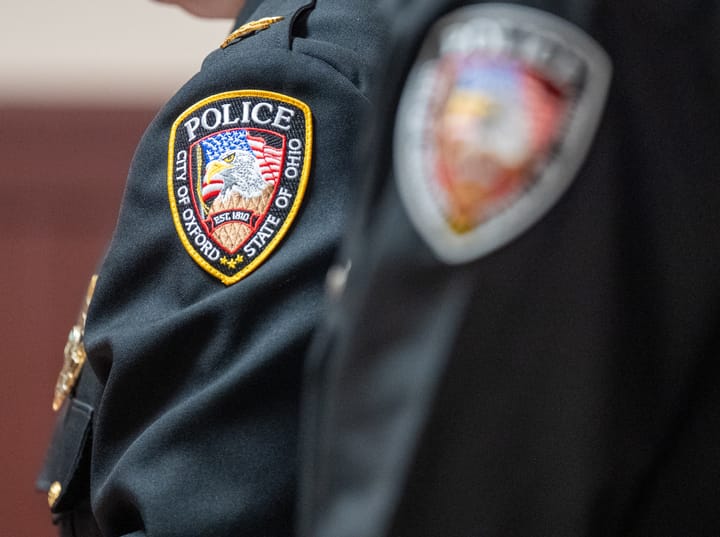4 Talawanda BOE members named in legal complaint
Four Talawanda Board of Education members and the school district superintendent were accused of violating constitutional rights in a complaint filed in a United States District Court this month.

A legal complaint was filed against the Talawanda Board of Education (BOE) earlier this month that accuses four BOE members and the district superintendent of violating constitutional rights.
The complaint, filed in the United States District Court of the Southern District of Ohio Western Division by plaintiff Scotty King, lists Superintendent Edward Theroux, Board President Rebecca Howard, and board members Chris Otto, Pat Meade and Matt Wyatt as defendants. Another member, Dawn King, Scotty King’s wife, was not listed.
The complaint references a resolution adopted by the board in May, which it said imposed “sweeping and indefinite restrictions on (Scotty’s) ability to attend, observe, and participate in public meetings.
According to the complaint, “These restrictions require him to speak only once for three minutes, prohibit him from approaching or speaking to Board members or employees outside that period, force him to leave the premises immediately after meetings, and direct police to enforce these limitations.”
According to Board Policy 0169.1, referenced in the letter sent to Scotty King by Howard reviewing his restrictions at future board meetings from May 16, statements by any member of the public speaking during the public participation portion of board meetings is limited to three minutes.
Howard continued in the letter, Scotty King is directed to immediately exit Talawanda High School (the location of BOE meetings) following the conclusion of the meetings and not to approach or engage with any board member, employee or representative before, during or after meetings.
The letter, resolution, and a copy of the board policy referenced were used as an exhibit in the complaint.
In the complaint, Scotty is referenced as “an outspoken critic of the Board’s policies and conduct,” for which the complaint says the resolution was adopted as a direct response.
According to the complaint, the resolution was both read and adopted in open session without giving Scotty King notice or an opportunity to respond.
The resolution made references to Scotty King’s violations of board policy and guidelines, including “verbal and/or physical confrontations,” but according to the complaint, these were left vague, and specific incidents, dates and evidence were not identified.
According to the resolution passed by the board, “the Board and its administration have observed Scotty King violating the Policy and the Guidelines, including but not limited to engaging in verbal and/or physical confrontations with Board members before, during (not including remarks Mr. King makes in public participation), and after Board meetings.”
According to the complaint, Scotty King has never been removed from a board meeting for “disruptive conduct,” and he has never physically threatened a board member, employee or member of the public.
The complaint also references a public records request Scotty King said he submitted in September 2024, for which, according to the complaint, records were never produced.
The complaint also accuses the board of going into executive session on several occasions without first taking a vote.
Overall, the complaint accuses the board, superintendent and four BOE members of violating 14th Amendment clauses including substantive due process and procedural due process by both adopting a policy to restrict Scotty King’s actions at board meetings and by not giving him notice of the meeting to adopt the resolution.
The complaint also accuses all defendants of violating the First Amendment by placing prior restraint on free speech and through their “retaliation” against Scotty King.
The complaint accuses all defendants of violating Scotty King’s first amendment right of assembly and petition and association and his right of access to government information. The defendants are further accused in the complaint of violating Scotty King’s freedom of speech, assembly and petition in the Ohio Constitution.
The board and the defendants are accused in their official capacities in the complaint of violating the Ohio Open Meetings Act and the Ohio Public Records Act.
According to the complaint, Scotty King is asking for relief and is demanding a jury trial.
Scotty King’s complaint was filed on Oct. 8.
During a BOE meeting on Oct. 9, Howard referenced the resolution, saying, “In my six years on the board, we’ve never had before a no-contact resolution.”
“It has absolutely nothing to do with anything that has been said. It … in no way limits anyone’s participation,” Howard said. “Everyone participates equally – three minutes. It in no way keeps anyone out of this auditorium for the meetings.”
Howard said the resolution was decided on by the majority of the board because, when board member Meade was leaving a board meeting in April, Scotty King was seen “quickening his pace” to catch up with him and he “put his foot out and stepped on Mr. Meade’s heel, intending to trip him.”
“That no-contact resolution is literally no physical contact. This was in response to someone attempting to cause physical harm to a board member,” Howard said. “I think it's important for people to know that we are not infringing on anyone’s First Amendment rights. We welcome everyone in public participation and treat everyone equally in that process.”
When the Oxford Free Press reached out to Theroux and the school district’s director of communications Monday for an official comment, Theroux responded via email the complaint is now an active case, and the district cannot comment at this time.




